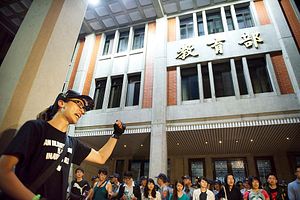“We cannot tear out a single page from our life,” George Sand wrote, “but we can throw the whole book into the fire.” These words, from the masterpiece Mauprat, a novel about political equality and education reform set on the eve of the French Revolution, came to mind as I read J. Michael Cole’s July 24 and July 31 reports on Taiwan’s recent protests. Like the book, this is a story about political equality and education reform, and like the book, it too might end with a trial. Unlike Mauprat however, the changes in Taiwan seem more likely to begin a reign of tyranny than end one.
In July, hundreds of Taiwanese students staged a sit-in outside Taiwan’s Ministry of Education, protesting changes to history textbooks that promote a “one China” perspective. On July 23, a group of protesters climbed barbed wire fences, scaled ladders, and broke into Minister of Education Wu Se-hwa’s office, barricading the door with chairs, filing cabinets, and tables. Thirty-three (including 24 students) were later arrested.
On July 30, Lin Kuan-hua, a student at Juang Jing Vocational High School, a spokesman for the Northern Taiwan Anti-Curriculum Changes Alliance, and one of the students arrested, posted this message on his Facebook page: “I have only one wish: Minister, please withdraw the textbook guidelines.” It was Lin’s 20th birthday that day. His mother said she had noticed a change in his mood the day before, and he had recently asked his sister why he was facing prosecution, “even though … he was doing the right thing.” After posting his Facebook message, Lin locked the door to his room and lit a pan of charcoal. His body was found later that day, and students outside the education ministry held a candlelit vigil that night and sang “Happy Birthday.”
The reason for Lin’s suicide remains unclear. In a June interview, he described how his teacher and school principal visited his house, telling him he was ruining his life by giving his voice to the anti-curriculum cause. His parents were also furious. According to Cole’s report, during the vigil, one young man identified himself as Lin’s boyfriend and asked everyone to recall Lin’s activism rather than his suicide. In other words, whatever the page he couldn’t tear out, we should remember the book.
The current debate over specific curriculum changes speaks to a deeper concerns about Taiwan’s desire for equality and the use of education as an instrument of truth, rather than a pitchfork for propaganda. Beijing could develop relations with Taiwan that serve its regional interests while respecting the desire of Taiwanese to remain free–but that doesn’t seem to be what Beijing wants. Zhang Zhijun, the director of Beijing’s Taiwan Affairs Office, spoke at a forum on China-Taiwan relations on Thursday where he questioned whether Taiwan would return “to the evil ways of Taiwan independence.”
Compare this reaction to events in 2005, when the Japanese government approved a nationalist textbook that omitted details concerning Japanese war crimes, including this two-sentence gloss of the Nanjing massacre:
“Many Chinese soldiers and civilians were killed or wounded by Japanese troops (the Nanking Incident). Documentary evidence has raised doubts about the actual number of victims claimed by the incident.”
Tokyo approved the text because, despite its inexcusable omissions, it contained no factual errors and was thus ineligible for censorship. Furthermore, the material was sold as a trade book rather than an academic text, the Nikkyoso (Japan Teachers Union) condemned it, and less than one-tenth of one percent of the nation’s schools adopted it for use.
Nevertheless, the book’s publication set off alarmingly intense anti-Japanese demonstrations in China. Japanese restaurants were vandalized, Japanese automobiles were burned, and Japanese citizens were attacked. Thousands upon thousands of Chinese in dozens of cities across the country rampaged for several weeks. This was the result of decades of state-spun anti-Japanese propaganda, yet Chinese officials criticized Japan for upholding freedom of expression by allowing the publication of a book scarcely any Japanese schoolchildren will ever see, rather than reflecting on their own education system and its promotion of ethnic hatred—the cause of the very crimes they worry will be forgotten.
So when Chinese violently rage against Japanese freedom of expression, Chinese officials criticize Japan. When Taiwanese demonstrate for propaganda-free education, Chinese officials use words like “evil.” But even at their worst (and the 2005 textbook was about as bad as it gets), textbooks in Japan and Taiwan are better than in China, where even the word “censorship” is censored. The courage and activism of people like Lin makes me optimistic. But as for Taiwan’s future freedom, I am less certain, and sometimes think I can already smell the pages burning.
































